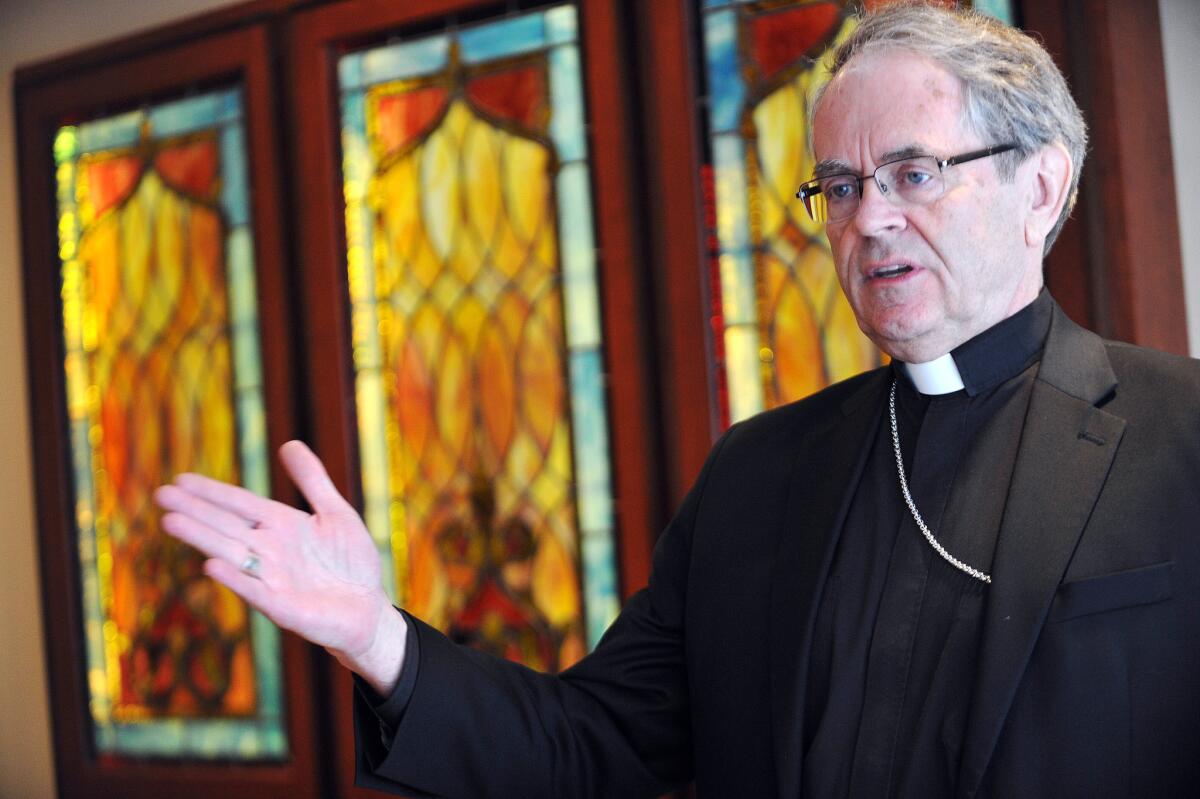Montana Catholic diocese files bankruptcy to settle sex abuse claims

- Share via
HELENA, Mont. — The Roman Catholic Diocese of Helena filed for bankruptcy protection Friday as part of a proposed $15-million settlement for hundreds of victims who say clergy members sexually abused them over decades while the church covered it up.
The Chapter 11 bankruptcy reorganization plan comes after confidential mediation sessions with the plaintiffs’ attorneys and insurers, resulting in a proposed deal to resolve the abuse claims, diocese officials said.
Bishop George Leo Thomas expressed his “profound sorrow” at a news conference and apologized to the victims.
“I know the pain is real, the pain is in the present tense, and in the name of the church, I want to say I’m sorry and we’re sorry as a church,” Thomas said.
The $15 million “will at least be a beginning point for people who are seeking resolution in their lives and in their hearts,” he added.
In addition to the money, the diocese must publicly apologize, publish the names of clergy members who have been credibly accused of abuse, offer to meet with abuse survivors, provide victim counseling and reinforce its policies and procedures to prevent abuse, plaintiffs’ attorneys said.
The diocese already has set up abuse-prevention programs, including worker screenings, a claims-review board and a hot line to report abuse.
The settlement details are being worked out, but the U.S. Bankruptcy Court in Montana would be responsible for approving and supervising the disbursement of $15 million to compensate the 362 victims identified in the two lawsuits.
In addition, at least $2.5 million will be set aside for victims who come forward later, according to the diocese.
The church anticipates paying that $2.5 million, with the rest paid by insurers.
Church officials are planning to pay the diocese’s share of the settlement with cash, though they may have to sell some property, Thomas said.
Molly Howard, an attorney for the plaintiffs in one of the lawsuits, said she believed the bankruptcy process would resolve the case more quickly than years of litigation and trials with uncertain outcomes.
“Given the age and ill health of many of the victims, this is in their best interest,” Howard said.
The Helena diocese is the 11th in the nation to seek bankruptcy protection in the face of sex-abuse claims.
David Clohessy, the executive director of the Survivors Network of those Abused by Priests, criticized the diocese for seeking bankruptcy protection, saying it would allow church officials to keep records closed that might have come out in a trial.
He also said the settlement fell short because it did not publicly name the church officials who shielded and protected predator clergy members.
“Those individuals have to be exposed and punished,” Clohessy said.
Thomas said in response that church officials would comb their records to see if there were “intentional failures of leadership.” But the records from the time of the abuse are incomplete, he said.
The two lawsuits filed in 2011 claim clergy members groomed and then abused the children from the 1940s to the 1970s. They claim the diocese shielded the offenders and knew or should have known the threat they posed to children.
The plaintiffs, the diocese and the Ursuline Sisters of the Western Province, another defendant, began mediation talks in 2012, but the negotiations faltered with legal challenges by the church’s insurers over the claims they are obligated to cover.
A court hearing was scheduled for Friday ahead of the first civil trials, which were to begin in March. Howard said she expected the court proceedings would be suspended.
The diocese’s territory covers all or part of 23 counties in western Montana and employs about 200 people in its parishes, schools and social service programs. The diocese was created in 1884, five years before Montana became a state, and covered the entire state until the Diocese of Great Falls was formed in 1904, according to the Helena diocese’s website.
Most clergy members who were accused in the lawsuits have died, and none remains in active ministry, diocese officials said.
In one of the lawsuits, the plaintiffs said they were repeatedly raped, fondled or forced to perform sex acts while at school, on the playground, on camping trips or at the victims’ homes.
The second lawsuit, filed a week after the first in 2011, includes 95 of the 362 plaintiffs and contains similar allegations against priests, but also alleged that nuns at the Ursuline Academy in the town of St. Ignatius abused dozens of Native American children.
The Ursulines are not part of the proposed settlement, the diocese said.
Blaine Tamaki, the plaintiffs’ attorney in that lawsuit, said the case against the Ursulines would move forward.
Tom Johnson, an attorney for the Ursulines, acknowledged the sides were still far apart in negotiations, but that the order intended to either settle or file for bankruptcy.
ALSO:
Feds to help pay for tracking devices for autistic children
Good Samaritan in a helicopter helps the snow-stranded in Birmingham
Arizona State fraternity apologizes for MLK-themed party mocking blacks
More to Read
Sign up for Essential California
The most important California stories and recommendations in your inbox every morning.
You may occasionally receive promotional content from the Los Angeles Times.










